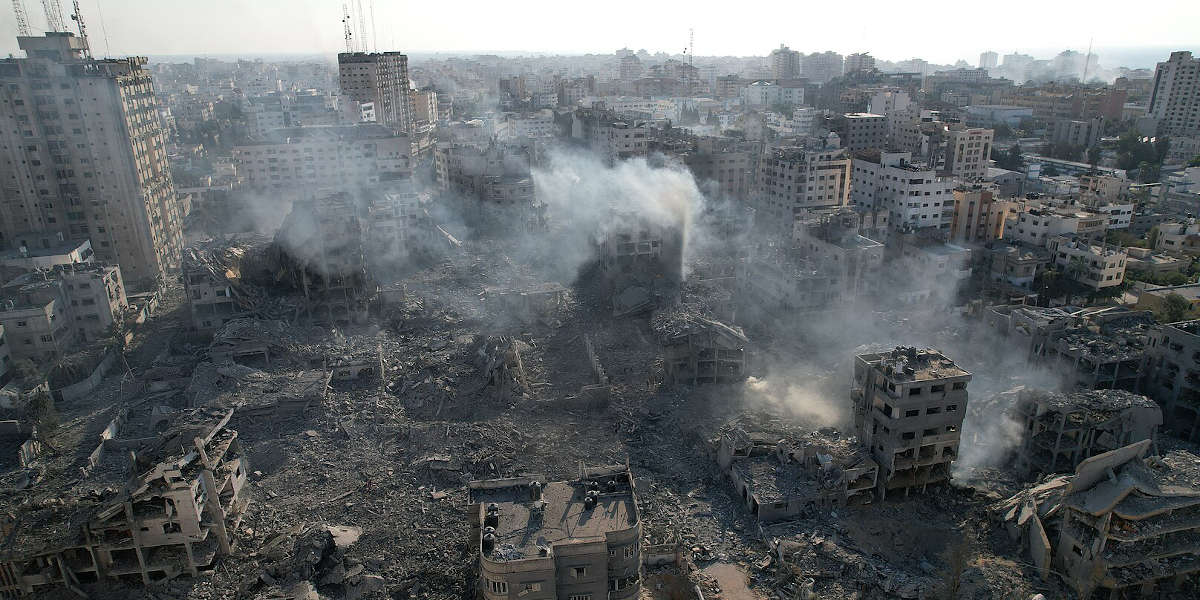In the image
Residential buildings were destroyed in Gaza during the of intensive bombing by Israeli Army [Al Araby]
Since the foundation of the State of Israel, numerous attempts have been made to establish peace throughout the region. However, the unresolved issues surrounding the status of Jerusalem, the mass displacement and dispossession of Palestinians, the rights of refugees, and the enlargement of Israeli settlements in Palestinian territories have made it extremely difficult.
On Saturday, October 7, 2023, Hamas, an organization labelled as a terrorist group by the United States, Canada, or the European Union, executed an attack of unprecedented magnitude. The consequences of this shocking event resounded across Israel, leaving its population in state of shock, commotion, anger, and uncertainty. Moreover, criticism toward the government’s vulnerability in the face of this crisis has been hugely widespread.
This attack, comparable in severity to historical milestones such as 9/11 or the Pearl Harbor attack in December 1941, stands as the most significant in Israel’s history and marks the onset of the last war in the Middle East.
The attack has made clear two issues that are key to understand the conflict. To begin with, while Iran remains the primary security concern for Israel, the Palestinian matter continues to exert a substantial influence on Israel’s security dynamics. Hamas’s unprecedented infiltration and hostage-taking operation strategically caught Israeli military intelligence off-guard. Despite Israel’s technological superiority and self-perception of strength and invincibility, the attack took it by surprise, resulting in one of the most devastating days in Israel’s recent history. Israel’s underestimation of Hamas’ capacity to plan a large-scale attack involving thousands of fighters, coupled with the mistaken belief that negotiations would lead to de-escalation, might have left Israeli intelligence services unprepared.
Secondly, the current conflict goes beyond being a simple territorial one, where the solution could come with a territorial compromise, and carries existential implications. The Islamic Resistance Movement, a longstanding ally of Iran, holds a dual political and religious agenda, primarily aiming to establish an Islamic Government within a unified Palestinian State. Consequently, it seeks the disappearance of Israel from the geopolitical landscape; for them, peace will come only when one side is destroyed.
The recent declaration of war by Israel’s Prime Minister Benjamin Netanyahu, has demonstrated the intractable nature of the current crisis. Israel has taken drastic measures such as calling for an emergency union government, mobilizing 300,000 reservists, and imposing a siege on the Gaza Strip, depriving its residents of essential human supplies like food, water, and electricity. Moreover, in connection with Israel’s callon all Palestinians living in northern Gaza to head south, Palestinians insist on their right to return to the territories they left in 1948, a possibility Israel opposes, as it would threaten the Jewish majority within the country’s borders, which, in turn, would pose a challenge to the very existence of the State of Israel and revert to the situation before independence.
This extremely complex conflict is compounded by hostile perceptions, ongoing military actions, a high level of violence, the captivity of numerous hostages, the challenges associated with the need to fight an enemy that is difficult to identify in a densely urbanized environment with civilians used as human shields, and that of having to strike a balance between the harshness of the response with Israel’s strategic needs.
The current question revolves around how Israel can recover from this significant failure and vulnerable defense. A complete blockade and airstrikes are insufficient “to obliterate Hamas terrorist capabilities”; however, Israel faces limited options in Gaza.
Israel appears to be preparing for a large-scale offensive in which its military seeks to exact multi-revenge on Hamas. Such an unprecedented attack is likely to provoke an equally unprecedented response, making a major ground intervention the most probable course of action. However, given the densely populated nature of the area, such an operation would pose significant challenges for the Israeli military and have devastating consequences for Palestinian civilians. Furthermore, beyond Gaza, Israel must also contend with the threat of escalation in Lebanon with Hezbollah, which has been testing Israel’s limits by launching missiles in the Golan Heights, as well as with the Iran-linked targets in Syria.
Whatever the final decision, it is safe to conclude that the current peak of violence in this old conflict will change it, moving it to a new stage whose shockwaves will be felt beyond the region.

